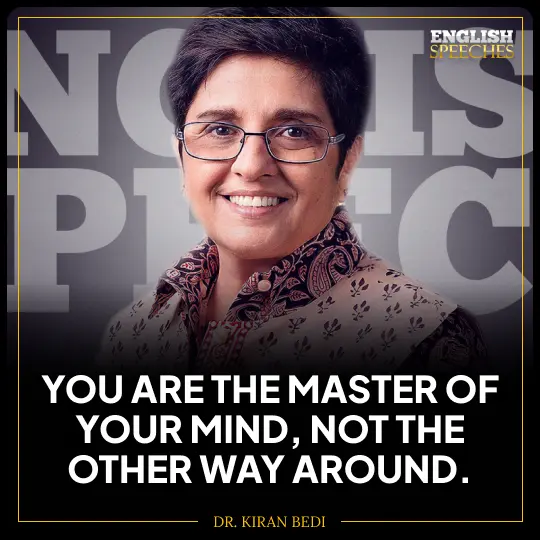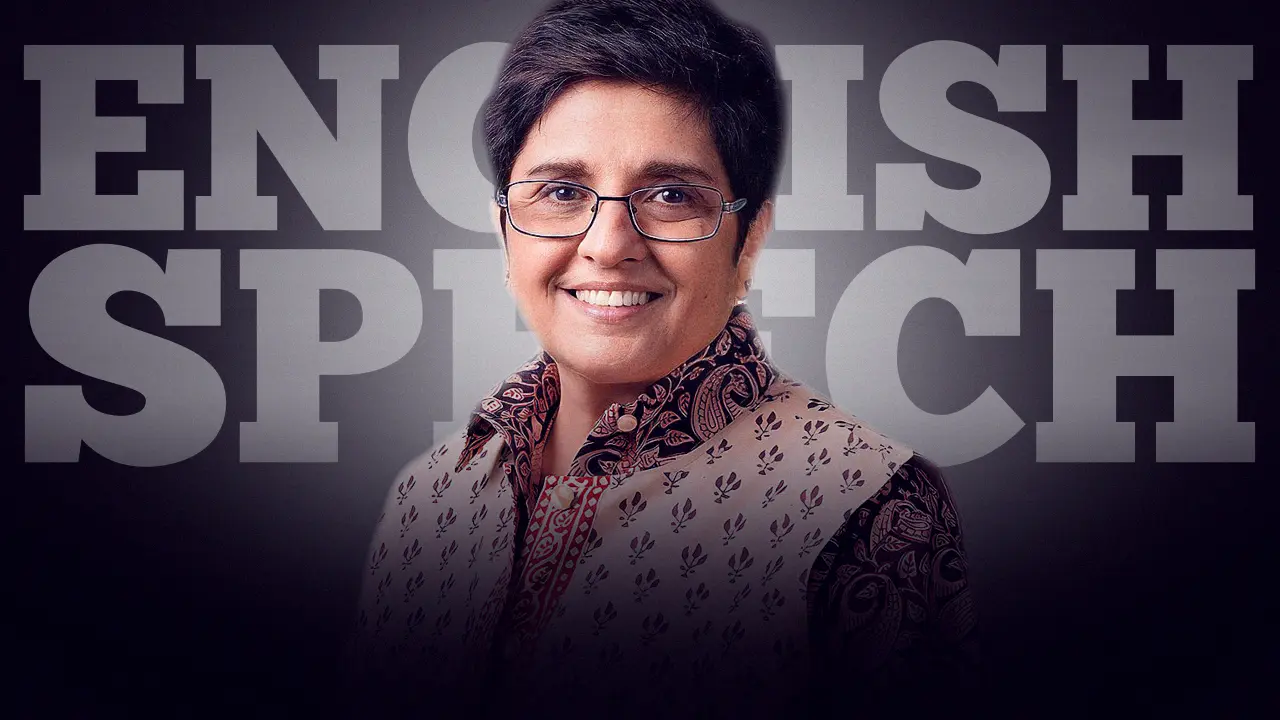Learn English with Dr. Kiran Bedi. She addresses the importance of road safety in Puducherry during the closure of Road Safety Week celebrations. She emphasizes the coordinated approach of Engineering, Education, and Enforcement (the 3Es) for enhancing road safety. Discover how these elements interplay to ensure safer roads and responsible driving in the region.
Donwload available for Premium Subscribers
PDF Full Transcript
Explore every word with our concise PDF transcripts.
Audio Version
Immerse in speeches with clear, downloadable audios.
English Lesson
Enhance English skills with interactive speech lessons.
⚬ Free 30-day trial

”You are the master of your mind, not the other way around.
Transcript
I congratulate our Chief Secretary, our Secretary Transport, our Director Transport, our DGP and all other colleagues for successfully organizing a whole very intensive Road Safety Week. Let’s all clap and thank them.
In my view, road safety or road usage reflects the character, it reflects the character of that place. Two things reflect the character of a place. One is the road surface, second is the road user. Let me come to the road surface. The governance and administration is the better will the road be. Why? Because the road construction would be of higher quality. We spend a lot of money on the road construction but what actually is spent on the road construction is reflected or goes into the road construction is reflected on the quality of the road. And if you go from state to state, place to place, the road quality of the road varies. It varies. You see the highway, you see the state highway, you see the road here and you see a village road. The element of integrity is reflected in the road and there’s a lot of road safety attached to it. If the quality of the road engineering is good, there will be better road safety. But if the quality of the road is bad, it will impact on the road safety.
So therefore, roads are reflective of the quality of the administration of a place. When you go to the Western countries, you see very good clean safe road. How many of you have seen that? How many of you have seen clean roads, broad roads, thick roads in the West? How many of you have seen it? Raise your hands. How many have seen it? Thank you. It reflects the seriousness in which they spend on the road and also the way the public works department or the road engineering spends on it. They do not compromise on it. They don’t make money out of the road. Here, the biggest money-making is coming out of road construction and that is why road safety is compromised.
Road safety, road construction is a very big source of revenue to people who would like to use the fund or let’s say abuse the fund. Whereas it is so well used correctly for road safety in places where they want to. You see a good highway, it means all that money has gone into that road. So road safety and road construction is interlinked. Road engineering, called the three E’s. Three E’s of road safety, first of all is engineering. If the engineering is good, there’s road safety. But if the engineering is defective, you see sudden breaks. So therefore, if you have to observe, if you have to achieve road safety, engineering, road engineering is very very vital.
The second E, along with it, like for instance if you’re going straight to the road and there are cuts in the road all the time, the cuts. You have a road and there’s a cut. You have a road, there’s a cut. But if there is no cut and you go on and there’s a very good engineering roundabout to come back, it reduces accidents. Whereas if you have a road and there are cuts and there are cuts and cuts and you suddenly in between come, you will have a lot of fatal accidents. So road engineering, road safety is not only dependent on the police regulation. It is a lot dependent on road engineering, for which we don’t have engineers sitting here. You only have law enforcers here, managers here, but not engineers here. So road engineering has to be a very vital part of road safety.
It’s like a double carriageway. When you drive and if you have two roads coming and if there is a central verge, you prevent accidents. But if you have no central verge, only one road going, one road, no central verge, the beams of the lights coming from the other side and my beams going on the other side has a blinding effect. You have lots of road accidents. Am I right? Am I right? So main point here is, even if you are a safe person, your road engineering is defective. It will lead to road accidents. So therefore, of no fault of the driver sometimes, you have real safety issues because of engineering. And I don’t think… the point here is we’ve never worked together as road engineers, road educator and road enforcer.
So the second thing is education. The second E of road safety is education. First is engineering. E for engineering, E for, what did I say? Education. Education is very occasionally a part of road safety. But if it is an intensive part of road, our growth in our schools, in our colleges, then road education. What is education? But if you don’t have a zebra crossing, where do you cross from? You get your driving license very weakly, where is the road education about? So licensing policy and road education again go hand in hand. How serious this is. In the West, it is impossible almost to get a driving license. Here, it is so easily available that we can get a quickly a license and sometimes we can have more than one license. So our licensing policy and road safety is so interlinked in road safety.
And the third E is enforcement. So three E’s define road safety. One is engineering, second is education and the third is enforcement. In the enforcement, traffic police management, traffic management is restricted to only regulation. It’s not on a tight enforcement. We must raise the fear of first of all regulation, second is enforcement. We must fine hugely in such a way that he does not do it again. But we are not afraid. I can pay 100 rupees all the time, 200 rupees all the time, but if I face, if I have fined 5000 rupees, 10,000 rupees, then I think twice before committing a violation. And therefore, our laws on enforcement are very lax and weak. They’ve been weak all the time.
Earlier, you could not even find people on the spot. If I go back to my deputy commissioner police traffic days, many years ago, I remember we used to do a challan on paper for signal violation and I used to, my police constable used to give a challan to the person and that person used to tear it off. Say here’s your challan, take it, take it. So I used to say 100 challans a day and we used to have 100 challans for motor vehicle act, whatever. Many of them used to tear it off and give it to the police constable. It made no difference because it had no effect. Paper challan had no effect.
Then came the spot prosecution during that time that you can collect or there were mobile vans, mobile magistrate vans, you could find and get the spot. It started to have an effect, but the challan money was very low. It was very low. With the result, it still wasn’t effective enough. Like for instance, drunken driving. Drunken driving offense is not as punitive as it should be because drunken driving means killing a man by negligence. It’s not by intention, but negligence that you’re drunk and you drive and you drive recklessly. So it’s driving, killing a person by negligence and it’s a rash or negligent act and it almost becomes billable at some time, soon enough. But the person is killed. Father is gone, but it is a death by negligence and the fine is not scary.
That’s why children died. The other day, day before yesterday in Hyderabad, SP traffic, DCP traffic has started. He arrested the parents of the minor children, minor driving the vehicle. Their parents were arrested day before yesterday. This was a radio news. Any minor who was driving the car, their parents were traced and they were arrested and sent to jail. Now that made news. That made news. Where the minor was sent to juvenile home, parents sent to jail. Isn’t it? Has this happened in Pondicherry? Have you heard about it? I’m asking you, have you heard about it? Are you not understanding my English? Have you heard about it in Pondicherry? No. This is what we need to do. We need to do that. To me, this is enforcement. The third E. Enforce in such a way that they will not do it again. Not enforce in such a way that it’s easy, okay, okay. Enforce in such a way that you say okay never again.
So I would think the road safety campaign in Pondicherry should lead to a message that law, rule of law prevails in Pondicherry. You are caught, you will pay the heaviest fine. Heaviest fine so that you remember that you will never do it again. Pondicherry as a Union Territory has a very high rate of accidents. As our Chief Secretary was saying, helmet is still not a habit. It is an option. Whereas under the Motor Vehicle Act, it’s mandatory. Under the rules it’s mandatory. But it’s still an option. And you have maximum accidents because of head injuries. So it’s time that we say helmets have to be worn for your own safety. But it’s also mandatory.
Another serious thing which I’ve noticed is many vehicles are not insured. They don’t have a third-party insurance. So when you kill somebody, there’s no insurance. No insurance for the other person. So how is that person going to be compensated? Under the Motor Vehicle Act also. So friends, message for Road Pondicherry is that fine must be scared of. You must got to be afraid of being fined. And the fine should be heavy penalty. Confiscation of the vehicle, maybe arrest of the person. If there’s a minor, trace the parent and arrest the parent. Because when the minor is driving and the minor is driving recklessly, then the vicarious liability and according to the law section 180, the parent is equally liable. And that’s what Hyderabad police did. I would urge my law enforcer, particularly the Director General of Police and the all our SPs of traffic, inspectors of traffic, sub inspectors of traffic, that this Road Safety Week should take us towards heavy enforcement.
We have made awareness for seven days. Seven days all about road safety. Road safety has been spoken about. If we have to lead it to an advantage or towards better road safety, then you must lead towards tighter enforcement. And enforcement is when you have found out not have insured vehicle or a minor is driving or there’s drunken driving. At least these three should be very heavily fined. And the vehicle should be confiscated. It should be detained in the so that he understands that he has to be without a vehicle for some time. And including if we have to reduce fatal accidents for the benefit of the self, road helmet has to be made compulsory.
When you going for a patrol for any reason, whether it’s registration, you are served a helmet, you are buying a vehicle, you are getting a license, you have to have helmet if you don’t have a helmet so that you get it straight away at that place. These I think are things for which Road Safety Weeks are meant to be celebrated. Engineering issues, education issues and enforcement issues. How do we build education? How do we improve our engineering? And how do we improve our enforcement? And since enforcement straight away, at the moment what is sitting before you is enforcement.
Engineering, I don’t see engineering sitting here as chief engineer whose public works department builds the roads for us or the municipal roads who make the municipal roads for us. They’re very, very risky and they’re not engineeringly cleared at all sometimes. It’s not three E’s working together. School principal, chief engineer and the traffic chief. They don’t three sometimes work together. You need to work together. School principal, road engineer and the SP traffic. Three need to work together. Unless the three E’s work together, there is no road safety.
So I would take, I would hope that our, what hope? We’ll make sure, why hope? We’ll make sure that our officers down the line, the inspectors of traffic who are very active these days, our policemen who are on the job, our camera technology use, catching them by the number and then sending them the fine is further strengthened and reinforced in the coming days. It is already very well on ground but I think we can do even more from the enforcement point of view, particularly on the minors driving, triple riding, triple riding. Take the vehicle to the police station, call the parents of these triple riders, don’t give the vehicle for the next two days you see the change.
You have to be tough on enforcement. How many times will you keep requesting, requesting, requesting? Nobody gives you anything by request. Nobody pays a tax on request. Nobody cleans up the villages on request. Nobody does on request, don’t work anymore. It has to be tight on enforcement, even if it hurts, even if it pinches you. Enforce, nobody voluntarily obeys the law, nobody voluntarily parks properly. It’s not a habit. So therefore enforce the issue, the burden on enforcement has to be very, very high and our men and women who are on enforcement should be thoroughly educated on these laws of enforcement and things will be better. Hopefully Puducherry will be safer driving, better driving, more regulated and more road space available for people to market or to drive or to walk. Thank you very much.




